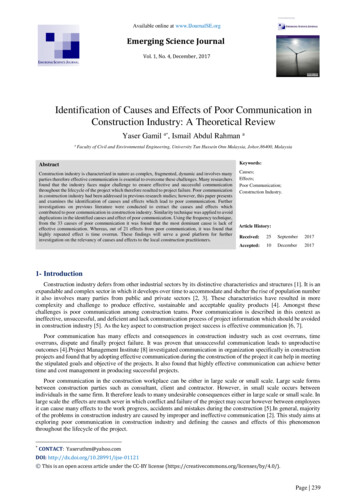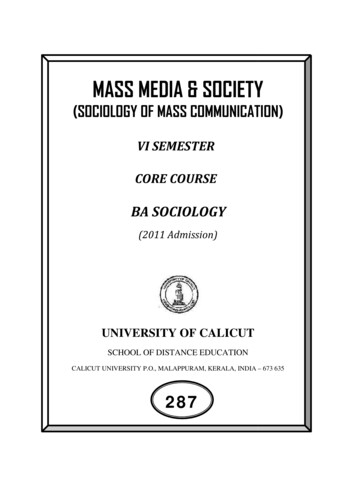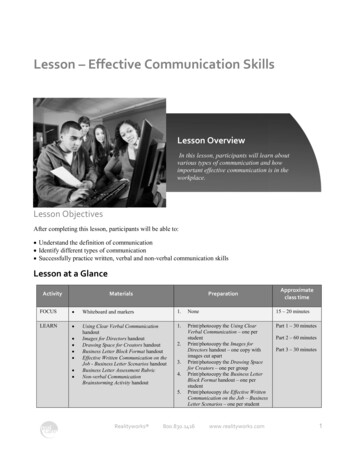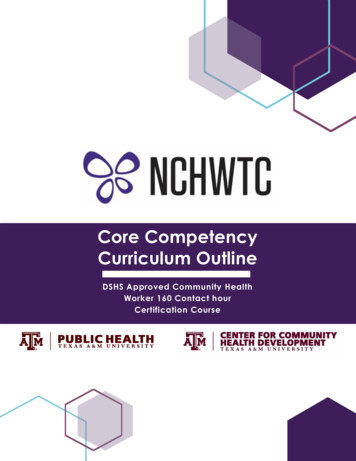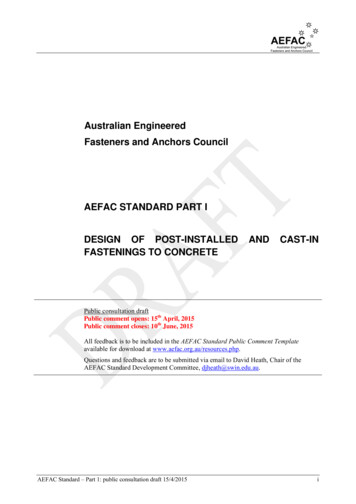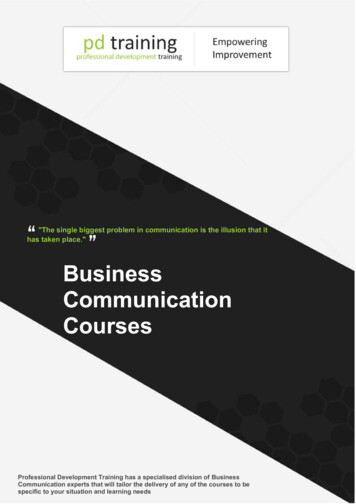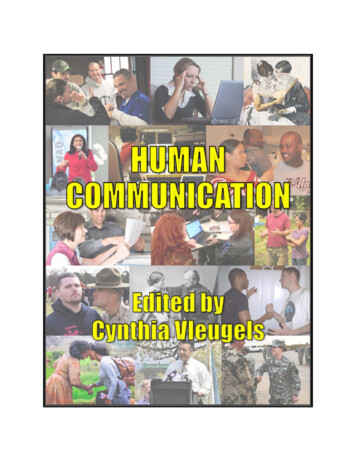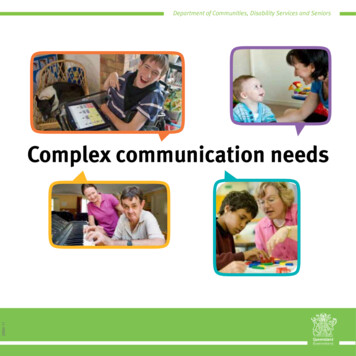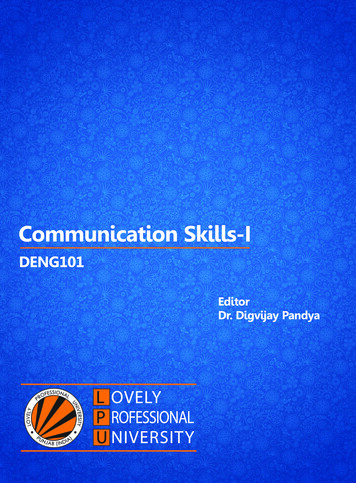
Transcription
Communication Skills-IDENG101EditorDr. Digvijay Pandya
www.lpude.inDIRECTORATE OF DISTANCE EDUCATIONCOMMUNICATION SKILLS-IEdited ByDr. Digvijay Pandya
ISBN: 978-93-87034-64-8Printed byEXCEL BOOKS PRIVATE LIMITEDRegd. Office: E-77, South Ext. Part-I, Delhi-110049Corporate Office: 1E/14, Jhandewalan Extension, New Delhi-110055 91-8800697053, celbooks.comforLovely Professional UniversityPhagwara
CONTENTSUnit 1:Simple Rules of Pronunciation and IntonationAjoy Batta, Lovely Professional University1Unit 2:Theme Based Vocabulary BuildingJayatee Bhattacharya, Lovely Professional University8Unit 3:Antonyms, Synonyms and HomonymsJayatee Bhattacharya, Lovely Professional University17Unit 4:Listening SkillsAjoy Batta, Lovely Professional University32Unit 5:Note Taking & Note MakingGowher Ahmad Naik, Lovely Professional University40Unit 6:Practising Listening SkillsJayatee Bhattacharya, Lovely Professional University57Unit 7:Comprehension PassagesJayatee Bhattacharya, Lovely Professional University67Unit 8:News and Magazine ArticlesJayatee Bhattacharya, Lovely Professional University77Unit 9:PoemsJayatee Bhattacharya, Lovely Professional University93Unit 10:Kinds of SentencesGowher Ahmad Naik, Lovely Professional University98Unit 11:Articles, Nouns, Adjectives and AdverbsSanjay Prasad Pandey, Lovely Professional University112Unit 12:PrepositionsAjoy Batta, Lovely Professional University128Unit 13:Basic Cohesive Paragraph WritingAjoy Batta, Lovely Professional University135Unit 14:Resume WritingJayatee Bhattacharya, Lovely Professional University154Unit 15:Job Application Writing and Acceptance LettersJayatee Bhattacharya, Lovely Professional University161
SYLLABUSCommunication Skills-IObjectives: Develop interest in literary works. Improve student's basic grammar, sentence construction and vocabulary. Hone writing skills. Build confidence in public speaking.S.No.1.DescriptionSpeaking skills: to enhance the basic speaking skills, one needs apt word and the correct pronunciation.1. Simple rules of pronunciation and intonation2. Theme based vocabulary building3. Antonyms/Synonyms/Homonyms2.Listening skills: to enhance correct understanding of the language being spoken and to give apt responses inreturn where required.4. Types of listening and Traits of a good listener5. Note taking6. Exercises Practising Listening Skills – talk shows , commentaries, etc., followed by identifying the theme,supporting ideas, or and digressions if any3.Reading skills: to enhance independent reading, comprehension and quick reading of any given texts aestheticappreciation7. comprehension passages8. news/magazine articles on stereotype topics and/or current topics9. 2 poems – Abu Ben Adhem. The Tiger4.Writing skills: to reinforce the grammatical structures10. Grammar – Kinds of sentences – Positive, negative, statement, interrogative and exclamatory [learn thefunctional aspects of these sentences – when are they used, how are they structured etc.]11. Articles and nouns – Countable/uncountable, Names with and without THE Adjectives/Adverbs –[describing things, adding information, circumstances ]12. Prepositions of time/place/reason – in , on, at , into , to , for , of, about, with, after etc.5.Writing skills: to enhance formally structured effective official writing13. Basic cohesive paragraph writing14. Note making,15. Resume writing16. Job application writing/acceptance letter
Ajoy Batta, Lovely Professional UniversityUnit 1: Simple Rules of Pronunciation and IntonationUnit 1: Simple Rules of Pronunciation and mple Rules for Pronunciation and Intonation1.2We can only stress vowels, not Consonants1.3Summary1.4Keywords1.5Self Assessment1.6Review Questions1.7Further ReadingsObjectivesAfter studying this unit, you will be able to:zLearn rules of pronunciationzAssess the importance of intonationIntroductionPronunciation refers to the way a word or a language is spoken, or the manner in which someonespeaks a word. If one is said to have “correct pronunciation”, then it refers to both within aparticular dialect. A word can be pronounced in different ways by various individuals or groups.It depends on many factors including the area in which they grew up, the area in which theynow live, if they have a speech or voice disorder, their ethnic group, their social class, or theireducation.Intonation is the rising and falling sounds of the voice when speaking.1.1 Simple Rules for Pronunciation and IntonationPronunciationThe sounds represented here are those of British English spoken with an R.P. (ReceivedPronounciation) accent. Other varieties of English differ considerably in pronunciation.LOVELY PROFESSIONAL UNIVERSITY1
Communication Skills-INotes2LOVELY PROFESSIONAL UNIVERSITY
Unit 1: Simple Rules of Pronunciation and IntonationNoteswww.ethnologue.comOnline linkMany people think that pronunciation is what makes up an accent. It may be that pronunciationis very important for an understandable accent. But it is intonation that gives the final touch thatmakes an accent native.Intonation is known as the use of pitch or tone in a sentence to convey meaning or emotion.Although the term when strictly used applies only to the pitch of speech, it is sometimes usedloosely to indicate also the emphasis and pacing used in the spoken language.Intonation is the “music” of a language, and is perhaps the most important element of a goodaccent. Often we hear someone speaking with perfect grammar, and perfect formation ofthe sounds of English but with a little something that gives them away as not being a nativespeaker.Therefore, it is necessary to realize that there is more than the correct pronunciation of the vowelsand consonants of a language. This is very important and we do stress it in other articles. But it isonly one of the three components to an accent, pronunciation, intonation, and linking.There are two very simple rules about word stress:Example: One word has only one stress. (One word cannot have two stresses. If youhear two stresses, you hear two words. Two stresses cannot be one word. It is true that there canbe a “secondary” stress in some words. But a secondary stress is much smaller than the main[primary] stress, and is only used in long words.)1.2 We can only Stress Vowels, not ConsonantsHere are some more, that can help you understand where to put the stress. But do not rely onthem too much, because there are many exceptions. It is better to try to “feel” the music of thelanguage and to add the stress naturally.Rule 1: Stress on first syllableRuleExampleMost 2-syllable nounsPRESent, EXport, CHIna, TAbleMost 2-syllable adjectivesPRESent, SLENder, CLEVer, HAPpyLOVELY PROFESSIONAL UNIVERSITY3
Communication Skills-INotesRule 2: Stress on last syllableRuleExampleMost 2-syllable verbsto preSENT, to exPORT, to deCIDE, to beGINNote There are many two-syllable words in English whose meaning and class changewith a change in stress.Example: Present, is a two-syllable word.If we stress the first syllable, it is a noun (gift) or an adjective (opposite of absent). But if we stressthe second syllable, it becomes a verb (to offer).Export, Import, Contract and Object can all be nouns or verbs depending on whether the stress ison the first or second syllableRule 3: Stress on penultimate syllableRuleExampleWords ending in -icGRAPHic, geoGRAPHic, geoLOGicWords ending in -sion and -tionteleVIsion, reveLAtionFor a few words, native English speakers don’t always “agree” on where to putNotethe stress.Examples: Some people say teleVIsion and others say TELevision.CONtroversy and conTROversy.Rule 4: Stress on ante-penultimate syllableRuleExampleWords ending in -cy, -ty, -phy and -gydeMOcracy, dependaBIlity, phoTOgraphy, geOLogyWords ending in -alCRItical, geoLOGicalRule 5: Compound wordsRuleExampleFor compound nouns, the stress is on the first partBLACKbird, GREENhouseFor compound adjectives, the stress is on the second partbad-TEMpered, old-FASHionedFor compound verbs, the stress is on the second partto underSTAND, to overFLOWRule 6: Two Word StressKnowing when and where to stress the words you use is very important for understanding, andtherefore, as part of a good accent. A clear example is that of stress in two word expressions.According to whether it is an ordinary two-word expression or a special, set expression, the placeof the stress changes. In an ordinary expression the two words are used to describe somethinglike a “white HOUSE” (meaning a house that is painted white, and not blue or gray). In thiscase the most important note is the noun because we are talking about a house that happens to bewhite. Similarly, a “fat BOY” is an overweight young male.4LOVELY PROFESSIONAL UNIVERSITY
Unit 1: Simple Rules of Pronunciation and IntonationBut sometimes short two word expressions are set or “consecrated”, (that is, they mean somethingspecial) and have to be made different from similar expressions. One example is “the WHITEhouse” where Mr. Bush lives. In this case, the emphasis is on the adjective because we are moreinterested in stressing that it is the house that is known because it is white. In the same way, “FATboy” is the nickname of a boy, chosen because the word fat emphasizes his weight.NotesIt will be useful for you to be aware of both types of two word expressions. Here is a list of afew that will get you thinking and give you some practice in identifying them and using themcorrectly. Underline the syllable that is stressed, and write a brief explanation, for both usesof each phrase. I start the exercise with two examples. You do the rest. Make sure you say thephrases OUT LOUD!Examples:1. WHITE houseIn Washington2. white HOUSEHouse painted whiteRule 7: Sentence IntonationStress on different words while speaking a sentence may imply a different meaning at differenttimes.Example: I don’t think he should get the job.This simple sentence can have many levels of meaning based on the word you stress. Considerthe meaning of the following sentences with the stressed word in bold. Read each sentence aloudand give a strong stress to the word in bold:I don’t think Hary should get the job.Meaning: Somebody else thinks Hary should get the job.I don’t think Hary should get the job.Meaning: It’s not true that I think Hary should get the job.I don’t think Hary should get that job.Meaning: That’s not really what I mean. OR I’m not sure Hary’ll get that job.I don’t think Hary should get that job.Meaning: Somebody else should get that job.I don’t think Hary should get that job.Meaning: In my opinion it’s wrong that Hary’s going to get that job.I don’t think Hary should get that job.Meaning: Hary should have to earn (be worthy of, work hard for) that job.I don’t think Hary should get that job.Meaning: Hary should get another job.I don’t think Hary should get that job.Meaning: Maybe Hary should get something else instead.LOVELY PROFESSIONAL UNIVERSITY5
Communication Skills-INotesAs you can see, there are many different ways this sentence can be understood. The importantpoint to remember is that the true meaning of the sentence is also expressed through the stressedword or words.Task Write out a number of sentences. Read each of them stressing a different word eachtime you read them. Notice how the meaning changes depending on which word youstress. Don’t be afraid to exaggerate the stress, in English we often use this device to addmeaning to a sentence. It’s very possible that when you think you are exaggerating, it willsound quite natural to native speakers.1.3 SummaryzPronunciation refers to the way a word is spoken.zA word can be pronounced differently by different individuals.zIntonation is variation of pitch while speaking which is not used to distinguish words.1.4 KeywordsAnte-penultimate: Third from endDiphthongs: A complex speech sound or glide that begins with one vowel and gradually changesto another vowel within the same syllablePenultimate: Second from endTriphthongs: A combination of three vowel sounds in a single syllable, forming a simple orcompound sound1.5 Self AssessmentFind the word where you do not pronounce one consonant:Example: Pencil, hour, cousin: Hour (H is silent)61.Cupboard, pub, pupil2.Bird, tiger, snake3.Wall, science, cave4.Tall, desk, half5.Wednesday, Monday, Sunday6.Country, child, knife7.Island, address, some8.Window, paint, pencil9.Hundred, green, white10.Lamp, autumn, bathLOVELY PROFESSIONAL UNIVERSITY
Unit 1: Simple Rules of Pronunciation and Intonation1.6 Review QuestionsNotesMatch the sentence version to the meaning given:Meaning1.I said Meghna might consider a new haircut.(i)Not just a haircut.2.I said Meghna might consider a new haircut.(ii)It’s a possibility.3.I said Meghna might consider a new haircut.(iii)It was my idea.4.I said Meghna might consider a new haircut.(iv)Not something else.5.I said Meghna might consider a new haircut.(v)Don’t you understand me?6.I said Meghna might consider a new haircut.(vi)Not another person.7.I said Meghna might consider a new haircut.(vii) Meghna should think about it.It is a good idea.Answers: Self ay6.Knife7.Island8.Window9.White10.Autumn1.7 Further ReadingsBooksAlice Oshima, Writing Academic English, Pearson Longman.Betty Schrampfer Azar, Understanding and Using English Grammar, Prentice HallCollege Div.Raymond Murphy, English Grammar in Use, Cambridge University Press.Susan F. Miller, Targeting Pronunciation: The Intonation, Sounds and Rhythm ofAmerican English, Houghton Mifflin Company.Online VELY PROFESSIONAL UNIVERSITY7
Jayatee Bhattacharya, Lovely Professional UniversityCommunication Skills-IUnit 2: Theme Based Vocabulary s of Speech2.1.1Affixes and ise (Mixed)2.2Word Formation2.3Gaining Precision in use of Words2.4Ways to Improve Vocabulary2.5Summary2.6Keywords2.7Self Assessment2.8Review Questions2.9Further ReadingsObjectivesAfter studying this unit, you will be able to:zUse the root words, prefixes and suffixes accurately in the sentences.zConstruct different words easily.zIdentify different ways of improving your vocabularyIntroductionIn this unit we will focus on vocabulary. We all know that words are the building blocks of alanguage. They are the very foundation that supports our thinking. The richness of a person’svocabulary is popularly thought to be a reflection of intelligence or level of education.A rich vocabulary also improves students’ ability to communicate through speaking, listening,and writing2.1 Parts of Speech2.1.1 Affixes and RootsAdding affixes to existing words (the base or root) to form new words is common in academicEnglish. Prefixes are added to the front of the base (like dislike), whereas suffixes are added to8LOVELY PROFESSIONAL UNIVERSITY
Unit 2: Theme Based Vocabulary Buildingthe end of the base (active activate). Prefixes usually do not change the class of the base word, butsuffixes usually do change the class of the word.NotesThe most common prefixes used to form new verbs in academic English are: re-, dis-, over-,un-, mis-, out-. The most common suffixes are: -ise, -en, -ate, -(i)fy. By far the most common affixin academic English is -ise.2.1.2 VerbsExample: prefix verb verbPrefixMeaningExamplesre-again or backrestructure, revisit, reappear, rebuild, refinancedis-reverses the meaning of the verbdisappear, disallow, disarm, disconnect, discontinueover-too muchoverbook, oversleep, overworkun-reverses the meaning of the verbunbend, uncouple, unfastenmis-badly or wronglymislead, misinform, misidentifyout-more or better than othersoutperform, outbidbe-make or causebefriend, belittleco-togetherco-exist, co-operate, co-ownde-do the opposite ofdevalue, deselectfore-earlier, beforeforeclose, foreseeinter-betweeninteract, intermix, interfacepre-beforepre-expose, prejudge, pretestsub-under/belowsubcontract, subdividetrans-across, overtransform, transcribe, transplantunder-not enoughunderfund, undersell, undervalue, underdevelopExample: Suffix used to form verbs with the meaning “cause to be”.SuffixExample-isestabilise, characterise, symbolise, visualise, specialise-atedifferentiate, liquidate, pollinate, duplicate, fabricate-fyclassify, exemplify, simplify, justify-enawaken, fasten, shorten, moisten2.1.3 NounsThe most common prefixes used to form new nouns in academic English are: co- and sub-. Themost common suffixes are: -tion, -ity, -er, -ness, -ism, -ment, -ant, -ship, -age, -ery. By far the mostcommon noun affix in academic English is -tion.Example: prefix noun nounPrefixMeaningExamplesanti-againstanticlimax, antidote, antithesisauto-Selfautobiography, automobilebi-Twobilingualism, biculturalism, bi-metalismco-jointco-founder, co-owner, co-descendantcounter-againstcounter-argument, counter-example, counter-proposalContd.LOVELY PROFESSIONAL UNIVERSITY9
Communication Skills-INotesdis-the converse ofdiscomfort, dislikeex-formerex-chairman, ex-hunterhyper-extremehyperinflation, hypersurfacein-the converse ofinattention, incoherence, eraction, inter-change, n, maltreatment, t, misdeed, mismanagementmini-smallmini-publication, mini-theorymono-Onemonosyllable, monograph, monogamyneo-Newneo-colonialism, ganisation, re-assessment, re-examinationsemi-Halfsemicircle, semi-darknesssub-belowsubset, subdivisionsuper-more than, abovesuperset, superimposition, superpowerssur-over and etripartismultra-beyondultrasoundunder-below, too littleunderpayment, under-development, undergraduatevice-deputyvice-presidentExample: Suffix added to a verb (V), noun (N) or adjective (A) nounSuffix-tionsionMeaningaction/instance of V-ing-er-ment-antentperson who V-ssomething used for V-ingaction/instance of V-ingperson who V-s-age-al-enceanceaction/result of Vaction/result of Vaction/result of V-ery/-ryaction/instance of V-ingplace of V-ingSuffix10Examplesalteration, demonstration expansion, inclusion,admissionadvertiser, drivercomputer, silencerdevelopment, punishment, unemploymentassistant, consultantstudentbreakage, wastage, packagedenial, proposal, refusal, dismissalpreference, dependence, interferenceattendance, acceptance, endurancebribery, robbery, miseryrefinery, bakeryMeaningExamples-erperson concerned with Nastronomer, geographer-ismdoctrine of NMarxism, Maoism, Thatcherism-shipstate of being Nfriendship, citizenship, leadership-agecollection of Nbaggage, plumageLOVELY PROFESSIONAL UNIVERSITY
Unit 2: Theme Based Vocabulary BuildingSuffix-ityMeaningExamplesstate or quality of being Aability, similarity, responsibility, curiosity-nessstate or quality of being Adarkness, preparedness, consciousness-cystate or quality of being Aurgency, efficiency, frequencyTaskNotesFind five new verbs and nouns by suffixing.2.1.4 AdjectivesMany adjectives are formed from a base of a different class with a suffix (e.g. -less, -ous). Adjectivescan also be formed from other adjectives, especially by the negative prefixes (un-, in- and non-).The most common suffixes are -al, -ent, -ive, -ous, -ful, -less.Example: Suffix added to verbs or nouns adjectiveSuffixExample-alcentral, political, national, optional, professional-entdifferent, dependent, excellent-iveattractive, effective, imaginative, repetitive-ouscontinuous, dangerous, famous-fulbeautiful, peaceful, careful-lessendless, homeless, careless, thoughtless-abledrinkable, countable, avoidable,Example: negative adjective adjectivePrefixExamplesun-unfortunate, uncomfortable, unjustim-/in-/ir-/il-immature, impatient, improbable, inconvenient, irreplaceable, illegalnon-non-fiction, non-political, non-neutraldis-disloyal, dissimilar, dishonest2.1.5 Exercise (Mixed)Example: Base with both prefix and suffixAdjectives: Uncomfortable, unavoidable, unimaginative, inactive, semi-circularNouns: Disappointment, misinformation, reformulation2.2 Word FormationWords can easily be built using root words. Also as you have seen, we have formed many wordsusing prefix and suffix to the root word.Formal written English uses nouns more than verbs.Example: judgment rather than judge, development rather than develop, admiration rather thanadmire.Example: There appeared to be evidence of differential treatment of children.LOVELY PROFESSIONAL UNIVERSITY11
Communication Skills-INotesThis is reflected in our admiration for people who have made something of their lives, sometimesagainst great odds, and in our somewhat disappointed judgment of those who merely driftthrough life.All airfields in the country would be nationalized, and the government would continue with thedevelopment of new aircraft as recommended by the Brabazon Committee.Associated with nominalization is the occurrence of prepositional phrases, introduced by of:judgment of thosetreatment of childrendevelopment of new aircraft-tion is the most common suffix used in this way.Example: alteration, resignation.However others are: -ity ability, similarity, complexity; -ness blindness, darkness, preparedness;-ment development, encouragement; -ship friendship; -age mileage; -ery robbery, bribery; -alarrival; -ance assistance, resemblance.2.3 Gaining Precision in use of WordsIt is important to use words correctly. It is common saying that no two words in the EnglishLanguage mean exactly the same. You need to understand the subtle difference in the words,and use them effectively. This is possible only with a very good command over words and byknowing the exact way they is used.Look, peep, watch and glance all are similar in meaning; but a clear understanding of each wordwill highlight the difference in its usage.You cannot replace one by another without changing the meaning of the sentence. It is essentialthat you gain precision in the use of words.2.4 Ways to Improve VocabularyEach of us stands testimony to the fact that it is an essential prerequisite to have a good vocabularyin order to communicate effectively. There are many ways to improve our vocabulary. Some ofthem are as under:1.12Flash Cards: Flash cards are an excellent method of reviewing both old and new vocabularywords. Not only are they the best way to learn vocabulary, you may also use them in otherways. For example, key ideas may be written out and reviewed. In addition, declensionssuch as the article can be put on a card for easy reviewing. These types of cards will need tobe larger than 2” x 4”. A full size index card would work for these purposes. Let us make aflash card now.(a)On the front of the flash card: Write a vocabulary word, and only the word, neatly onthe front of the card. Center the word both horizontally and vertically, and be sure tokeep the front of the card free from extra markings, smudges or doodles.(b)On the upper left corner of the back of the flash card: On the reverse side, the informationside of the flash card, write a definition for the word in the upper left corner. Makesure you write the definition in your own words. This is key. If you write a dictionarydefinition, you will be less likely to remember what the word means!(c)On the upper right corner of the back of the flash card: Write the part of speech in theupper right corner of the info side. Make sure you understand what the part of speechLOVELY PROFESSIONAL UNIVERSITY
Unit 2: Theme Based Vocabulary Buildingmeans before writing it down. Then, color-code it. Highlight the part of speech withone color. When you make another flashcard with another part of speech, you’lluse a different color. Make all the nouns yellow, all the verbs blue, etc. Your mindremembers colors really well, so you’ll start to associate color with the part of speech,and you’ll have an easier time remembering how the word functions in a sentence.(d)(e)NotesOn the lower left corner of the back of the flash card: Use the vocabulary word in a sentenceyou will remember. Make the sentence steamy, hilarious, or creative in some otherway. If you write a bland sentence, your chances of remembering what the wordmeans go way down.(i)Example of a memorable sentence: My pompous ex-boyfriend used to think hecould get any girl he wanted, until he met my friend Mandy, who laughed athis conceited self in front of the entire school.(ii)Example of a non-memorable sentence: The king, whose pompous heads-ofstate were trying to dethrone, decided to flee the country to save his own life.On the lower right corner of the back of the flash card: Draw a small picture/graphicto go with the vocabulary word. It doesn’t have to be artistic – just something thatreminds you of the definition. For the word “pompous,” or “conceited”, maybe you’ddraw a stick person with his nose in the air. Why? You remember pictures muchbetter than words, which is the reason you can’t write anything on the front of thecard besides the vocabulary word – you’d remember the design and associate it withthe definition instead of associating the word with the definition.Repeat this process for every one of your vocabulary words, until you have a deck of flashcards.2.Rote Method: This is something that we all hate. Rote the new words up to rememberthem. But isn’t it the way we used to learn new words in the childhood?So remember, when no other methods work, you should not hesitate to resort to the timetested rote method.3.Self Dictionary: We hear and read new words all of the time but rarely do we take the timeto look them up. When you hear an unfamiliar word, jot it down and take the time to lookit up later.4.Word Games: There are many games that can be played on-line. It not only serves as a wayto entertain but at the same time, develops your vocabulary. Some of the examples of suchgames are Word Search, Cross Words, Hang Mouse, Quiz, Match Game, Scramble, LetterBlocks, etc.5.Visualisation: At times there are very difficult words that can’t be learnt by any methodelse than visualization. Words can be related with something familiar and funny so that itcan be remembered.6.Reading: Read a lot. The experience of encountering unfamiliar words in print is remarkablyinstructive. First, because you’re already engaged in reading something, you are arguablymore motivated to learn a new word so that you better understand what you’re voluntarilyreading. Second, you have come across the word organically rather than artificially (i.e. in avocabulary list). You’ll pick up new words – and clarify meanings of words already in yourtoolkit – by exposing yourself to them in their, shall we say, natural habitat. The contextwill enrich your attempt to build a better vocabulary.Diversity of topics is important. Read some natural science stuff, applied science stuff,contemporary literature, Shakespeare, Psychology book and then consume a humorouswork. Varied reading will sharpen both general and subject-specific vocabularies.LOVELY PROFESSIONAL UNIVERSITY13
Communication Skills-INotesA manger may not feel the utility of subjects like History, Philosophy, Biology, Travel,Anthropology, Linguistics, Art, Gender Studies, Politics, etc. But a mind that knows variedfields has a rich vocabulary as well as is respected everywhere. You don’t have to be anexpert in all disciplines to build a meaty vocabulary, but you do need to be a well-informedreader who’s confident and comfortable reading on topics outside your areas of immediateexpertise.7.Interact in English: All said and done, we must try to improve our spoken English so towrite better. The more we speak in English, the better it would be for us to improve ourvocabulary.TaskCan you think of some words that are used or you may use in the followingsituations:(a)Describing the education system of India(b)Motivating an employee(c)Watching a movie(d)Reading a murder mystery(e)A Visit to the Taj Mahal(f)Gap between developed and developing countries(g)High inflation rate in the country2.5 SummaryzVocabulary is called word-power. Indeed it is the most important thing in a language thata person can possess, as it will help him succeed in his area of work.zThe ability to understand others and to express clearly and precisely comes from having agood vocabulary. It is important to recall the exact word which you want to use, as it is thatword which will express what you need to express most accurately.zUsing root words, prefixes and suffixes to different parts of speech helps to enhance theword-bank effectively.2.6 KeywordsAffix: A form added to the beginning, middle, or end of another word that creates a derivativeword.Precision: Exactness or accuracyPrefix: A linguistic element that is not an independent word, but is attached to the beginning of aword to modify its meaning. For example, “un-” is a prefix meaning “not.”Suffix: A letter or group of letters added at the end of a word or word part to form another word,e.g. “-ly” in “quickly” or “-ing” in “talking”14LOVELY PROFESSIONAL UNIVERSITY
Unit 2: Theme Based Vocabulary Building2.7 Self AssessmentNotesFill in the blanks:1.The most common prefixes used to form new nouns in academic English are: . and 2.Many adjectives are formed from a base of a different class with a .3.Words can be made by using . and suffixes.4.Some of the commonly used prefixes are ., . and .5.Some of the commonly used suffixes are , and .6.Look, peep, watch and glance all are .in meaning.7.The noun for the word ‘retire’ would be 8.The adjective for the
Speaking skills: to enhance the basic speaking skills, one needs apt word and the correct pronunciation. 1. Simple rules of pronunciation and intonation 2. Theme based vocabulary building 3. Antonyms/Synonyms/Homonyms 2. Listening skills: to enhance correct understanding of the language being spoken and to give apt responses in return where .
